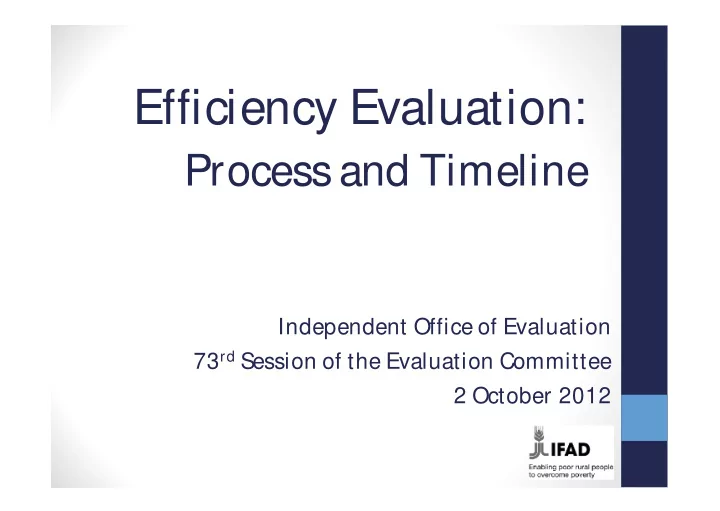

Efficiency Evaluation: Process and Timeline Independent Office of Evaluation 73 rd Session of the Evaluation Committee 2 October 2012
���������� • The ARRI treated the topic of efficiency as a learning theme discussed in the Executive Board in December 2010. • The Board approved in December 2010 the undertaking of the Corporate Level Evaluation on Efficiency in 2011-2012. • The Efficiency Evaluation approach paper was discussed in the Evaluation Committee at its 66 th session in March 2011. • Following IFAD bidding process, the Emerging Markets Forum signed an institutional contract on 22 September 2011. �
��������������������� The main objectives of the evaluation are to assess: i. operations and administrative efficiency, and determine the main factors that affect IFAD’s institutional efficiency; ii. the efficiency of IFAD governing bodies as it relates to the Fund’s overall institutional efficiency; iii. the efficiency of recipient country government’s institutions and processes that affect the efficiency of IFAD-supported projects; iv. how the efficiency of IFAD as well as the recipient government’s institutions and processes affects project efficiency including the proximate causes for good or less good performance; and develop efficiency indicators, approaches and requirements for better assessing project level and IFAD’s institutional efficiency; and � v. the evaluation’s fifth objectives is to develop recommendations to improve all four dimensions of efficiency, namely the efficiency of governments, IFAD, the Fund’s governing bodies, and IFAD-financed projects.
����������������������� • Inception report produced in 2011, expanding on overall evaluation approach and methods • Desk review phase completed with working papers available on: (i) operational efficiency; (ii) programme efficiency; (iii) organization, decision-making and delegation of authority; (iv) people management; (v) results and budget management; (vi) ICT; (vii) legal processes; (viii) oversight and support function; and (ix) efficiency of Governing Bodies (draft being finalized). • Interim report produced and shared with IFAD Management on 20 J uly 2012 • IOE expecting Management’s written comments on Interim report on 30 Sept � 2012
Additional Activities • Survey of Board members (J une 2012) • Five country visits to India, Honduras, Mali, Tanzania and Uganda (J uly-August 2012) • Discussions and collection of data and information from comparator organizations (August-September 2012) • Preparation of draft final report �
S ome Reflections • Unprecedented evaluation within and outside IFAD, with far-reaching objectives and coverage • Complex methodology and processes • Bidding process took longer than anticipated (March- September 2011) • Included areas not originally foreseen to be covered: such as legal processes, and the results measurement system - which required mobilization of additional expertise and time for analysis �
Next S teps (Revised in line with the guidance of and the agreement with the Evaluation C ommittee on 2 October 2012) • Consider IFAD Management comments on Interim Report (received on 8 October 2012) • Further analysis and production of Draft Final Report – October/ December 2012 • Presentation to the Evaluation Committee on 21-22 November 2012 of the main evaluation findings • Share Draft Final Report with Management early J anuary 2013 • IFAD Management comments –end J anuary 2013 • IOE to finalize report based on further Management comments – February 2013 • IFAD Management to prepare their official response to the evaluation – March 2013 � • Finalize report and present to April 2013 sessions of the Evaluation Committee and Executive Board
Benchmarking of time taken to conduct major evaluations Internal 1. J oint Evaluation with AfDB on Agriculture in Africa: Approach paper – J anuary 2008 • Final report discussed with Board – December 2009 ����������� • 2. Independent External Evaluation: TORs discussed with the Evaluation Committee – J uly 2003 • Final report discussed with Board – April 2005 ��� ������� • External (IEG World Bank evaluations) 1. The Global Fund to Fight Aids, Tuberculosis and Malaria: Approach paper discussed with CODE – February 2010 • Final report discussed with CODE – December 2011 ����������� • � 2. World Bank’s Response to the Global Economic Crisis: Approach paper – March 2010 • Final report – December 2011 ����������� •
Recommend
More recommend